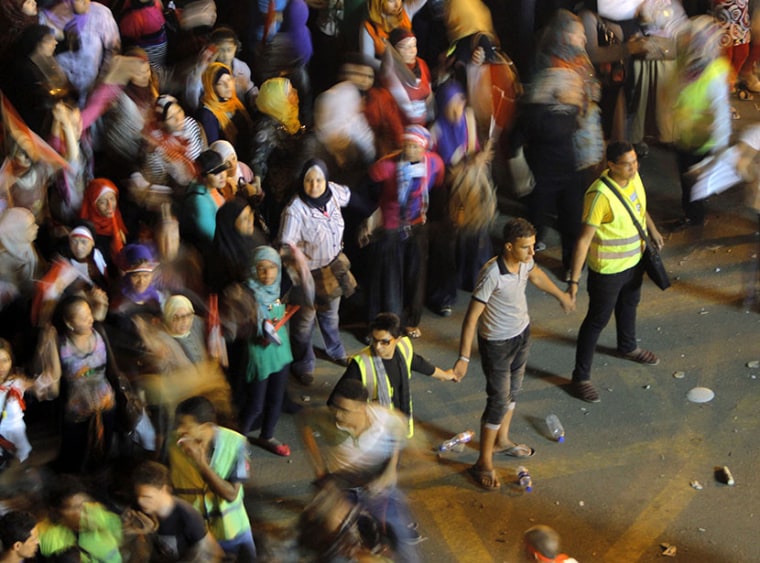Hundreds of thousands of demonstrators packed into Cairo’s Tahrir Square to celebrate the military's removal of Egyptian President Mohamed Morsi. But amid the fireworks and revelry, a sense of unruliness and unrest remains on the streets, further highlighted by a disturbing report released Wednesday by the Human Rights Watch.
Mobs sexually assaulted, and in some instances, raped at least 91 women at protests in a four-day period, the advocacy group confirmed. Though, Egyptian women's rights organizations suggested there could be even more.
“The rampant sexual attacks during the Tahrir Square protests highlight the failure of the government and all political parties to face up to the violence that women in Egypt experience on a daily basis in public spaces,” said Joe Stork, deputy Middle East director at Human Rights Watch, in a statement. “These are serious crimes that are holding women back from participating fully in the public life of Egypt at a critical point in the country’s development.”
This most recent wave of sexual violence began on June 30, based on reports from the group Operation Anti-Sexual Harassment/Assault, which runs a hotline for victims of sexual assault and tries to intervene in these clashes where women are vastly outnumbered. The group has been tweeting out daily stats and issuing warnings to women.
Stats for July 3rd (3:52 am, 4/07) over 80 assaults, we intervened in over 50. Seven needed medical att., 1 hospitalized & 2 rape cases.— قوةضدالتحرش/الاعتداء (@OpAntiSH) July 4, 2013
Women in #Tahrir avoid entrance of Tahrir St by Safir Travel, Hardee's and Mohamed Mahmoud St, all entrances and exists Sadat metro station— قوةضدالتحرش/الاعتداء (@OpAntiSH) July 3, 2013
The group said the level has ranged from sexual harassment and assault to rapes involving knives and other sharp objects. Some reports said that women endured as much as 45 minutes of being sexually assaulted. Many cases have required medical attention.
With little interference from local police during demonstrations and the sudden overthrow of the national leadership, imperiled protesters have been left to fend for themselves.
Along with OpAntiSH, members of the non-partisan activist group Tahrir Body Guard, comprised of both men and women, are taking matters into their own hands. Both were founded in 2012 to address the increasing problem of sexual harassment at demonstrations.
Tahrir Body Guard does exactly what the name implies. Wearing helmets and neon vests, they escort female protesters around the event and patrol the area for anyone in distress.
Gatherng point today is at 6:30 infront of Qasr el Dobara Church. We'll be in yellow vests&helmets. Send ur info to 01227161213 if u'll join— Tahrir Bodyguard (@TahrirBodyguard) July 3, 2013
For many, today is a day of celebration, but we cannot say the same about more than twenty #women attacked in #Tahrir today. Sad day.— Tahrir Bodyguard (@TahrirBodyguard) July 3, 2013
As recently as Monday, President Obama warned that Egyptians needed to “show restraint” as the threat of potential violence “remains there.”
“We have seen many reports of women being assaulted in these protests,” Obama said at a press conference in Tanzania. “And for those who are participating in these protests or marches, assaulting women does not qualify as peaceful protests.”
Sexual assaults at mass protests in Cairo appear to follow similar patterns: the unruly mob isolates their female prey, encircles her, the group rips off her clothing and gropes, then drags the victim to another location and continues to attack.
In 2011, CBS war correspondent Lara Logan called widespread attention to the issue after her own brutal attack by a mob in Tahrir Sqaure while she was covering the fall of Egyptian dictator Hosni Mubarak.
